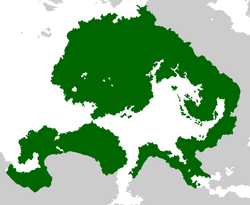Fiorentine Empire: Difference between revisions
| Line 67: | Line 67: | ||
==Society== | ==Society== | ||
==Government== | ==Government== | ||
Political historians studying the Fiorentines have traditionally separated the history of the Empire into four distinct phases. Each of these phases outlines the shifting governmental structure of the empire, particularly in relation to the role of the Fiorentine King or ''Rex''. | |||
===Foederate=== | ===Foederate=== | ||
a short period during which the rex is restrained by the treaties with the other cities | a short period during which the rex is restrained by the treaties with the other cities | ||
Revision as of 13:09, 24 March 2020
This article is incomplete because it is pending further input from participants, or it is a work-in-progress by one author. Please comment on this article's talk page to share your input, comments and questions. Note: To contribute to this article, you may need to seek help from the author(s) of this page. |
Fiorentine Empire Imperium Florentinum Βασιλεία Φιορεντίνα | |
|---|---|
| 346 BCE–492 | |
 Empire at its greatest extent in 80 CE | |
| Capital | Laterna |
| Common languages | Fiorentine Ancient Myrian |
| Religion | Alydianism |
| Government | Elective Absolute monarchy |
| Emperor | |
• 346 BCE–331 BCE | Leo I |
• 398-418 | Sebastianus |
• 481-482 | Trocundus |
• 482-483 | Majorian II |
• 483-485 | Boethius |
• 485-490 | Flavius Felix |
• 490–492 | Salonius Narcissus |
| Historical era | Classical era |
• Creation of Fiorentine League | 346 BCE |
| 492 | |
| Today part of | |
The Fiorentine Empire is a name used to refer to the ancient Fiorentine civilisation which ruled over much of Asura, West Sifhar and North Arabekh.
History
Society
Government
Political historians studying the Fiorentines have traditionally separated the history of the Empire into four distinct phases. Each of these phases outlines the shifting governmental structure of the empire, particularly in relation to the role of the Fiorentine King or Rex.
Foederate
a short period during which the rex is restrained by the treaties with the other cities
Dominate
a period in which the rex was near absolute, divine hereditary power etc. lasted from ~300 to ~218. Defeats in the Talsconensis wars see power shifted to the assembly
Consulate
a period in which oligarchs in the senate dominate political proceedings, with a lot of tension boiling socially. The Rex is essentially a figurehead, and during this period the hereditary line dies out, making the position elective.
During the late period military generals become far more important, numerous civil wars occur.
Imperialis
In this period the position of Rex is largely filled by strongmen generals who monopolise military power and rely more upon their imperium than their position as Rex. Usually differentiated between an earlier and later period, with later Imperators relying upon military governors and warlords and often ending up mere figureheads
